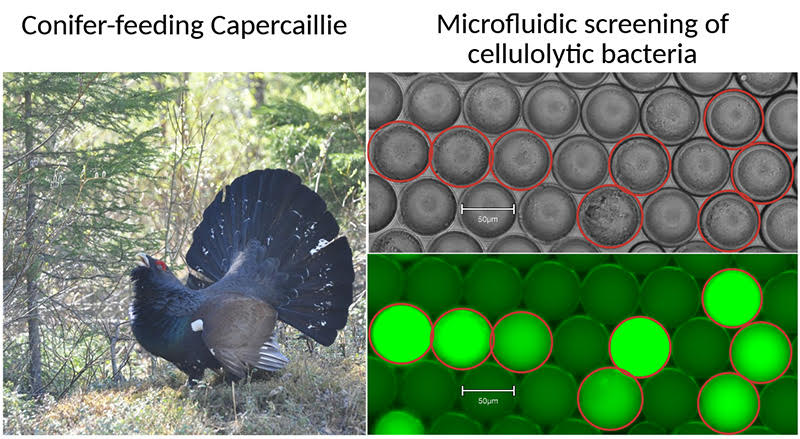Dr. Adam Pyzik received a grant from NCN in the Sonata 20 competition on the topic of the microbiome of the capercaillie

23 07 2025
Dr. Adam Pyzik from the Department of Molecular Biology at the Institute of Biochemistry will be implementing the Sonata 20 grant titled “Study of the conifer-specialized microbiome of the Western Capercaillie (Tetrao urogallus): implications for animal science and biotechnological approaches to lignocellulose biodegradation.” The aim of this interdisciplinary project is to investigate the diversity and functions of the Western Capercaillie microbiome, as well as the related challenges in degrading lignocellulosic biomass using a combination of classical microbiological techniques, advanced microfluidic technology and DNA sequencing and metabolic analyses.
The Western Capercaillie (Tetrao urogallus) is the largest grouse species in Europe. It is known for its distinctive appearance and behavior. Historically, it held significance as a popular game species. Currently, it is regarded as a keystone species for forest conservation. Protecting the capercaillie not only ensures its survival but also supports the preservation of other species dependent on forest ecosystems. Despite many conservation efforts, capercaillie populations are declining rapidly across Europe, especially in central and western regions. The main causes are habitat destruction, predation pressure, and disturbances caused by human activities.
Recent studies on other animals have highlighted the crucial role of the gut microbiome — a complex community of microorganisms — in energy acquisition from food and overall health. This relationship is particularly important for the capercaillie, which has a highly specialized diet consisting mainly of pine and spruce needles, seasonally supplemented with leaves, buds, and berries from shrubs like blueberries. These foods, rich in lignocellulose and resins, are difficult to digest without the help of specific gut microorganisms. Disruptions in microbiome development — caused by factors such as captivity, stress from human activities, or environmental pollutants (e.g., heavy metals or polycyclic aromatic hydrocarbons in needles) — can significantly affect microbiome functionality. Such disturbances may hinder nutrient absorption, weaken the bird’s condition, and complicate conservation efforts.
Dr. Pyzik will collect research material from fecal samples of wild capercaillie populations in Poland and individuals from breeding centers. The project will analyze microbiome variability at individual, population, and environmental levels, shedding light on microorganisms crucial for the diet and survival of the species.
The results could contribute to more effective conservation strategies and reintroduction programs for this endangered species. Additionally, the selected collection of cultured bacteria may have applications beyond conservation, such as supporting biotechnological innovations like biogas production from conifer biomass in the energy sector or improving feeding strategies for related species, e.g., turkeys, in agriculture.